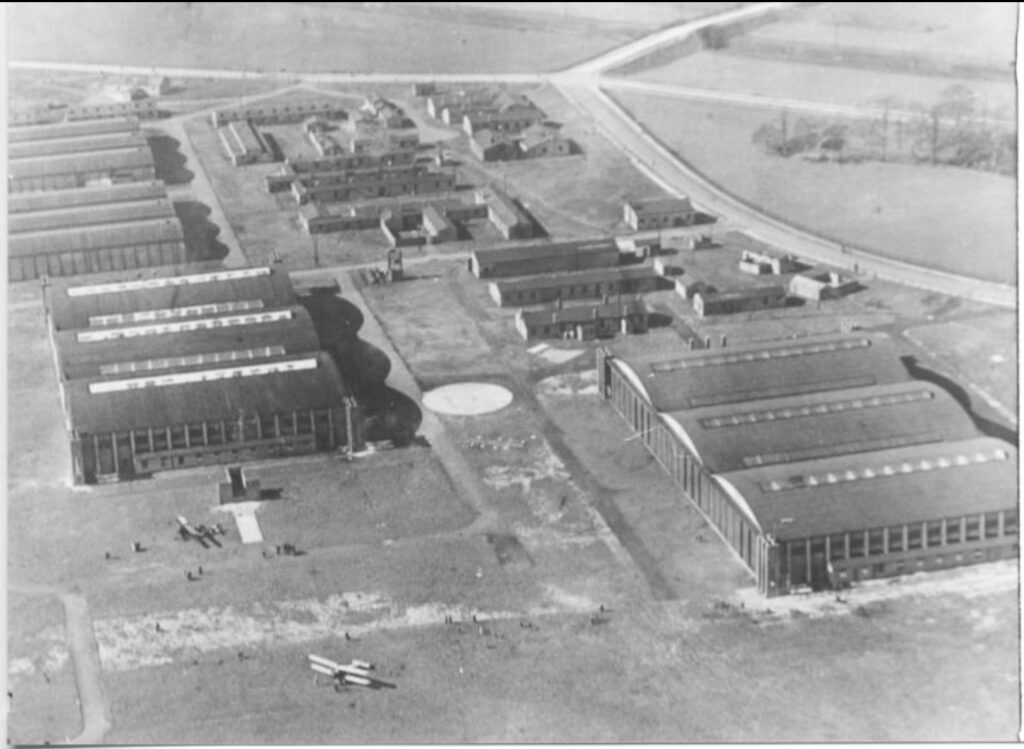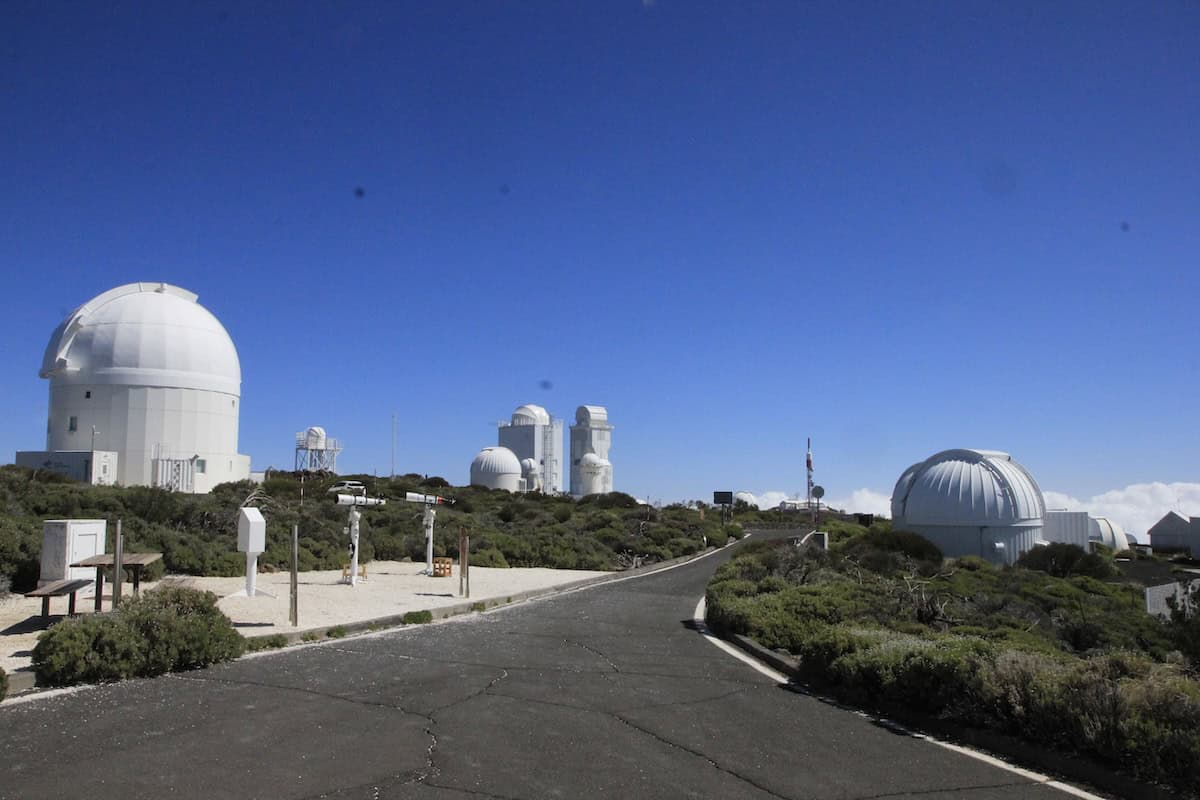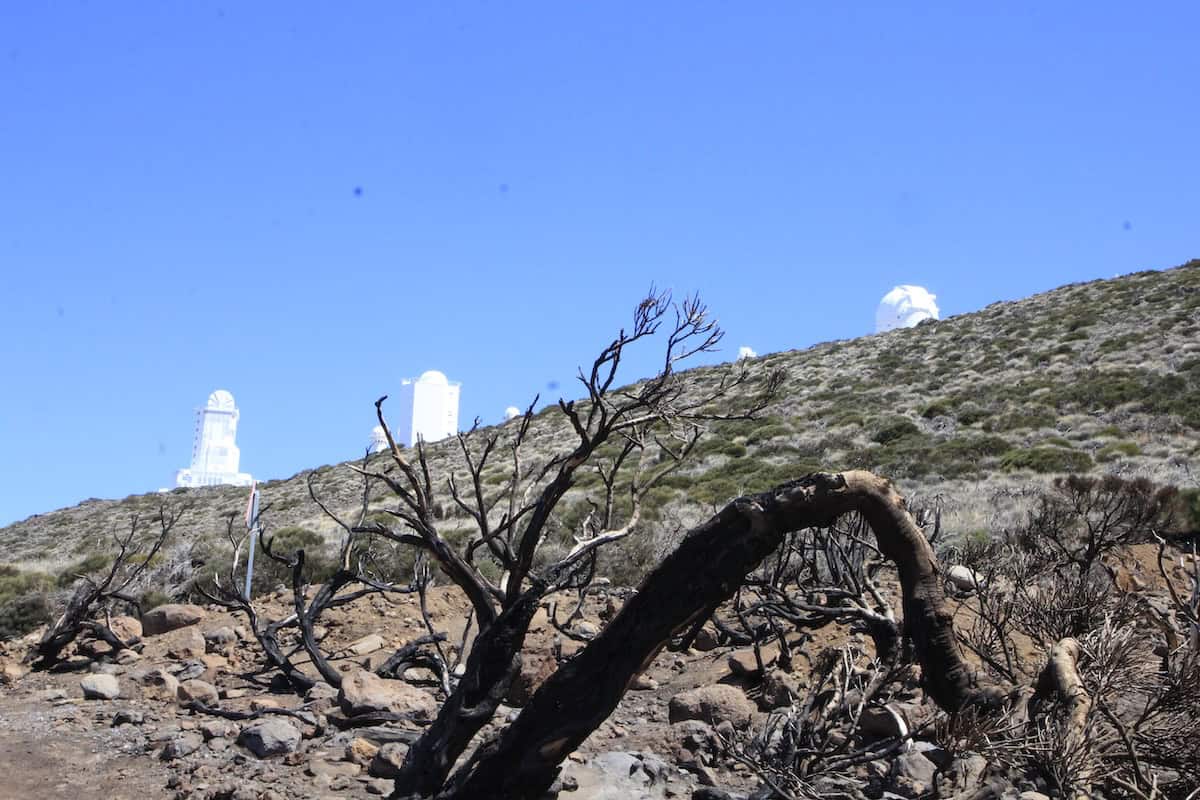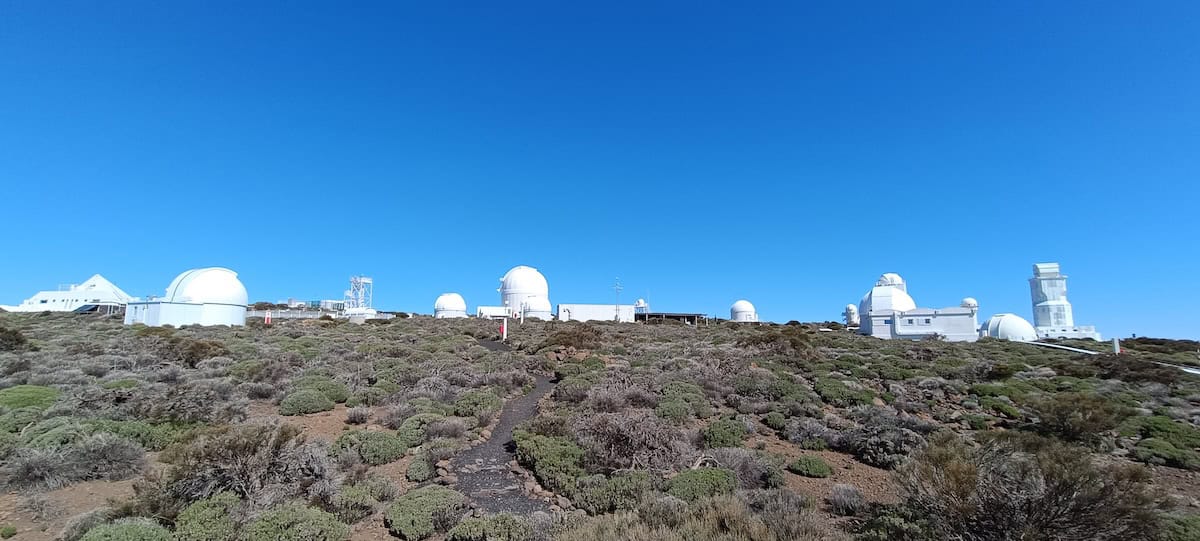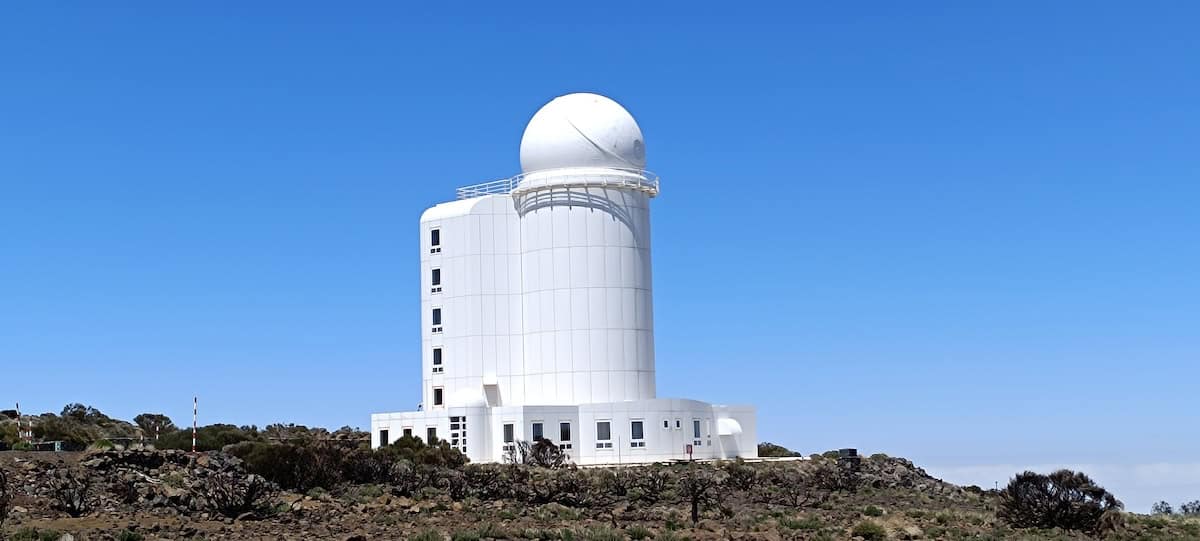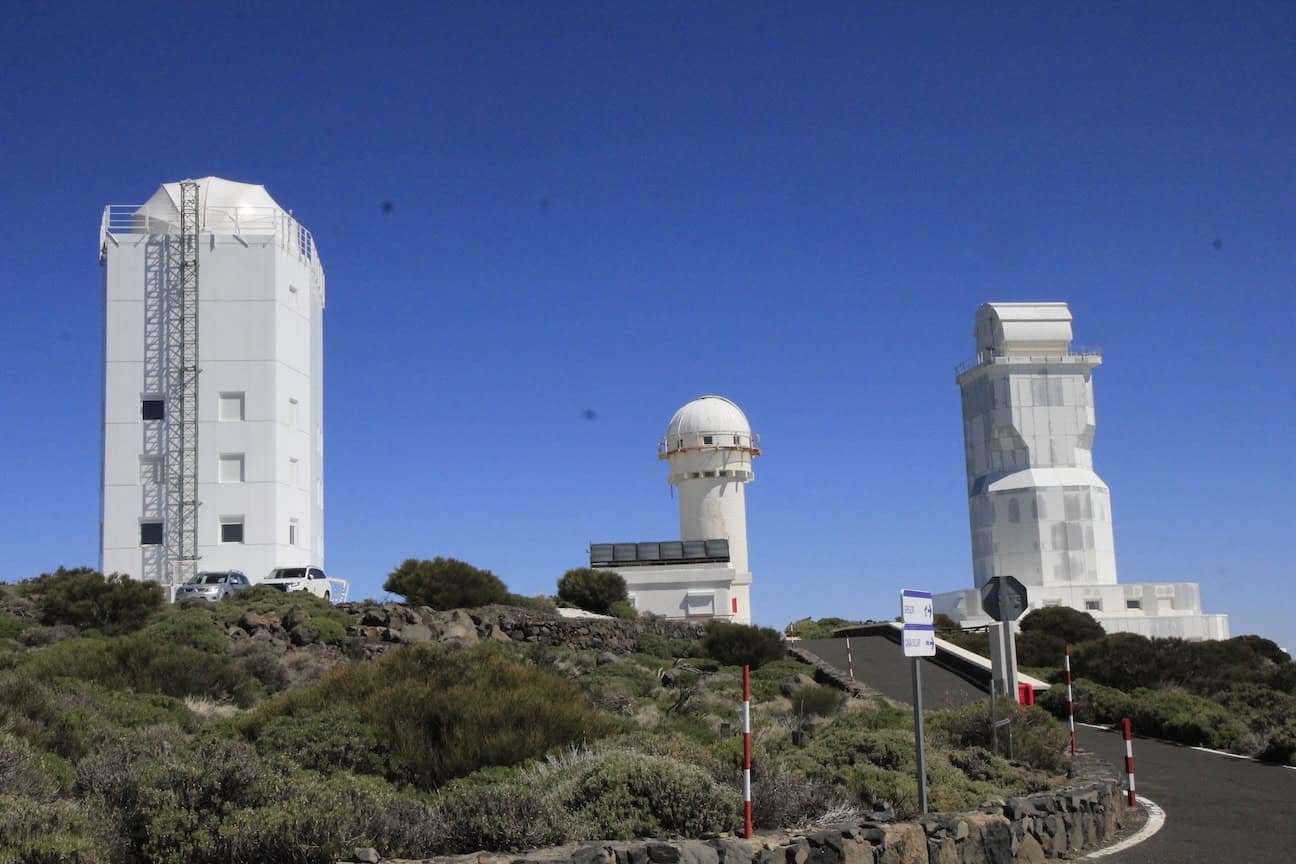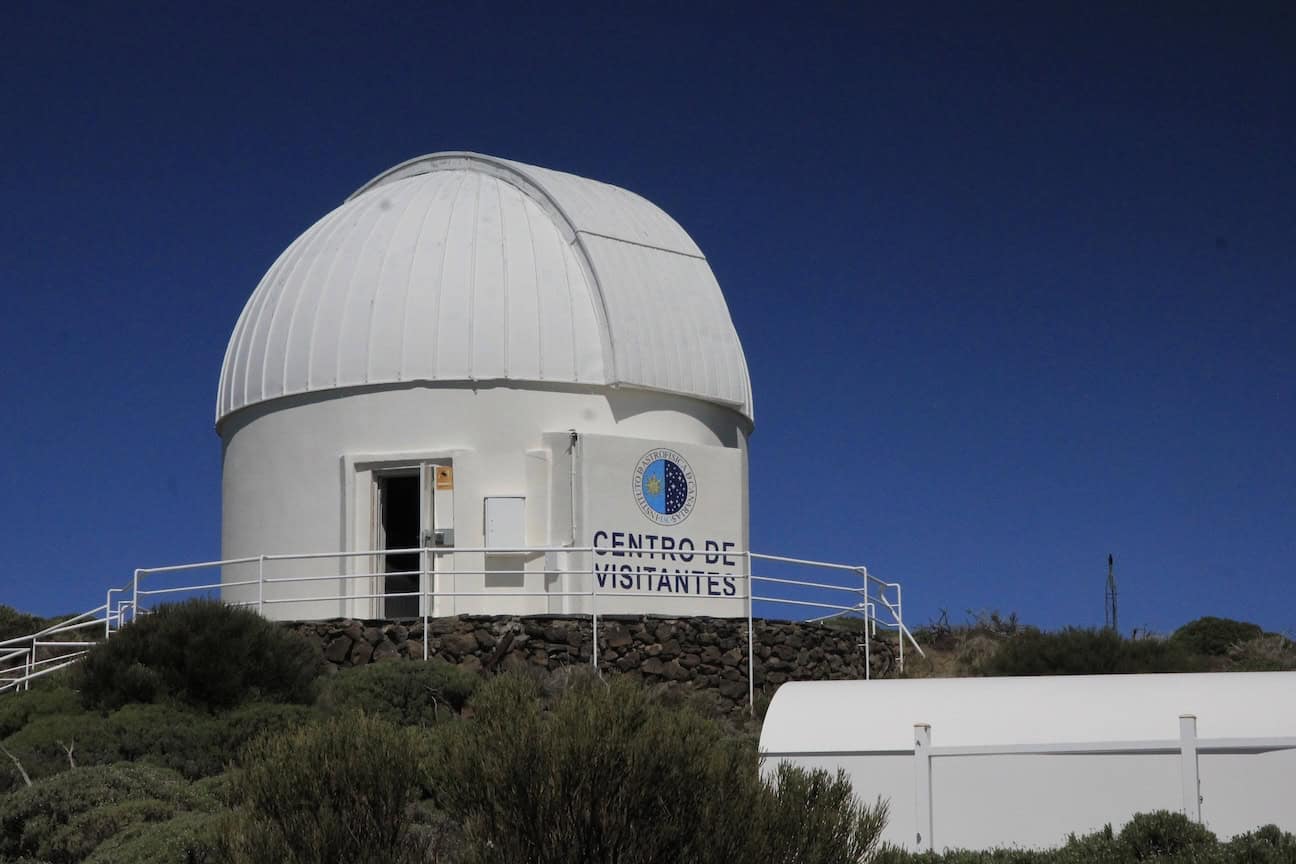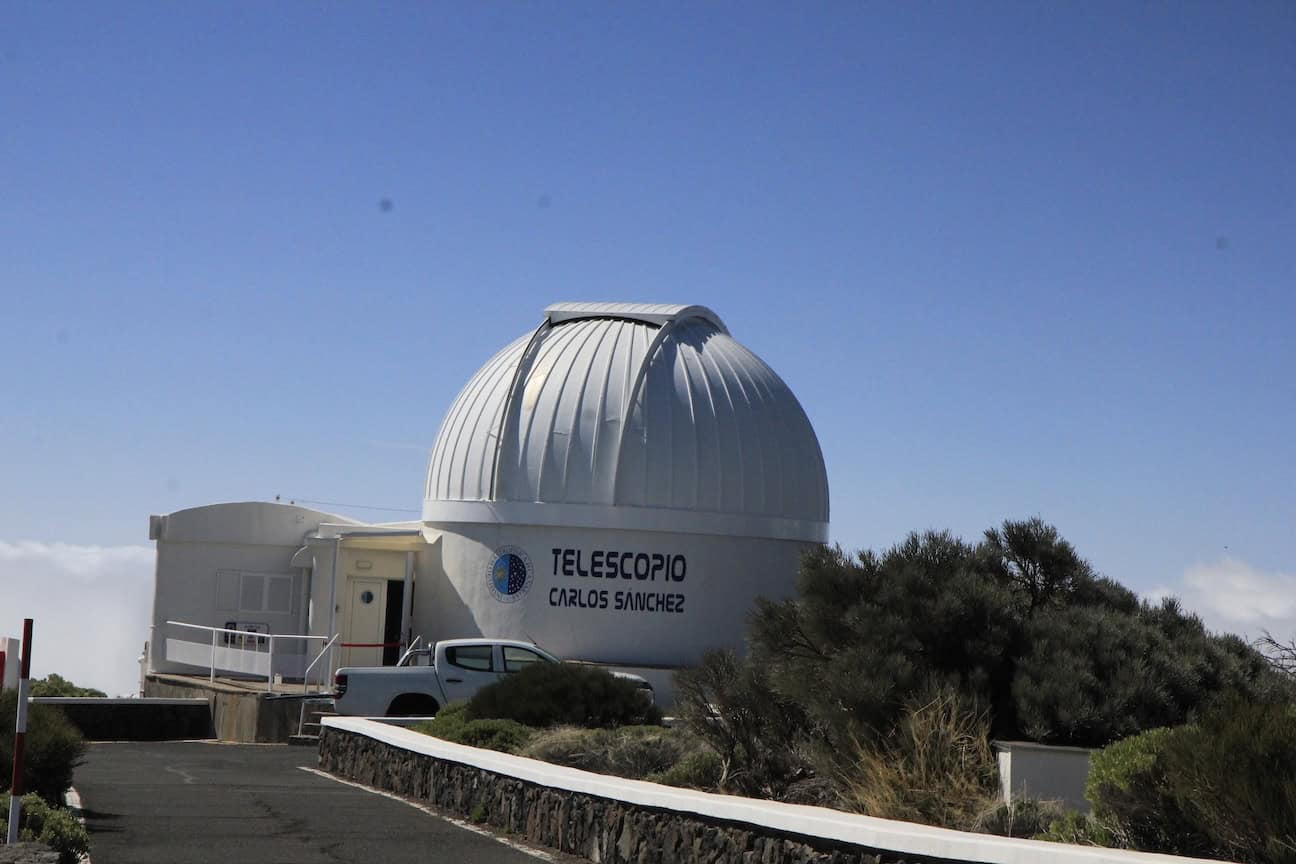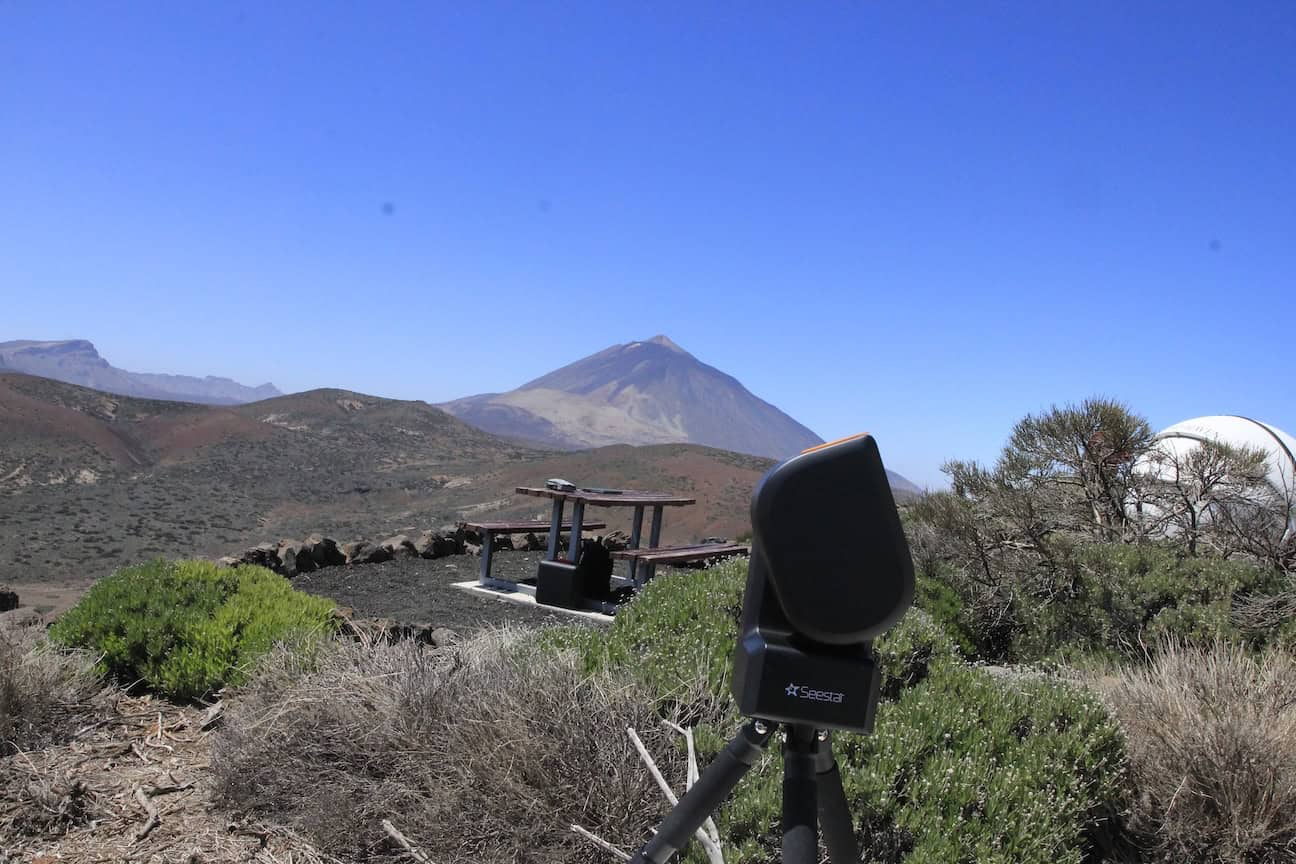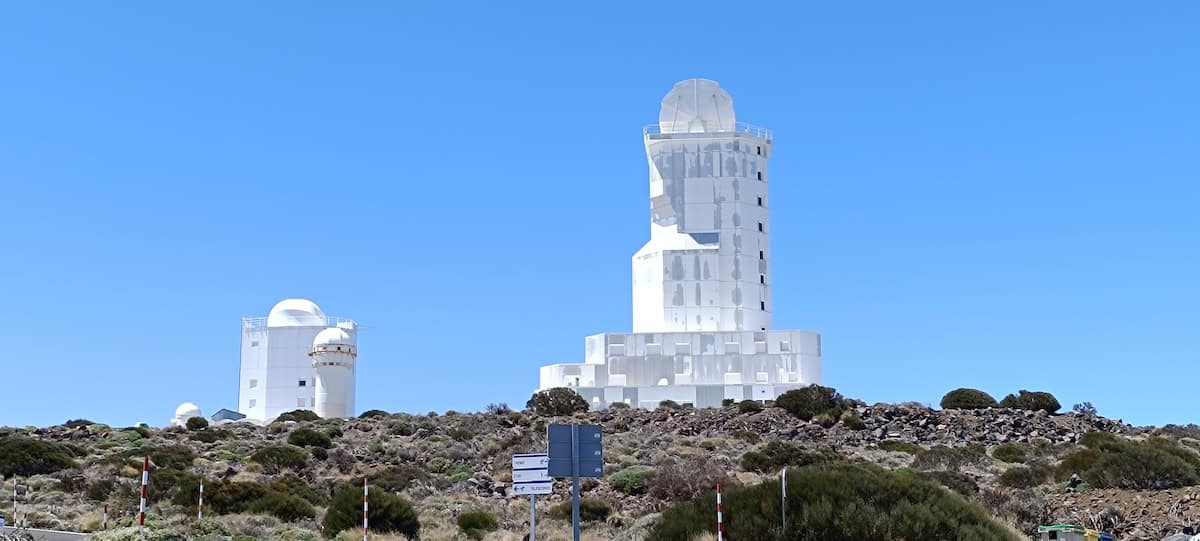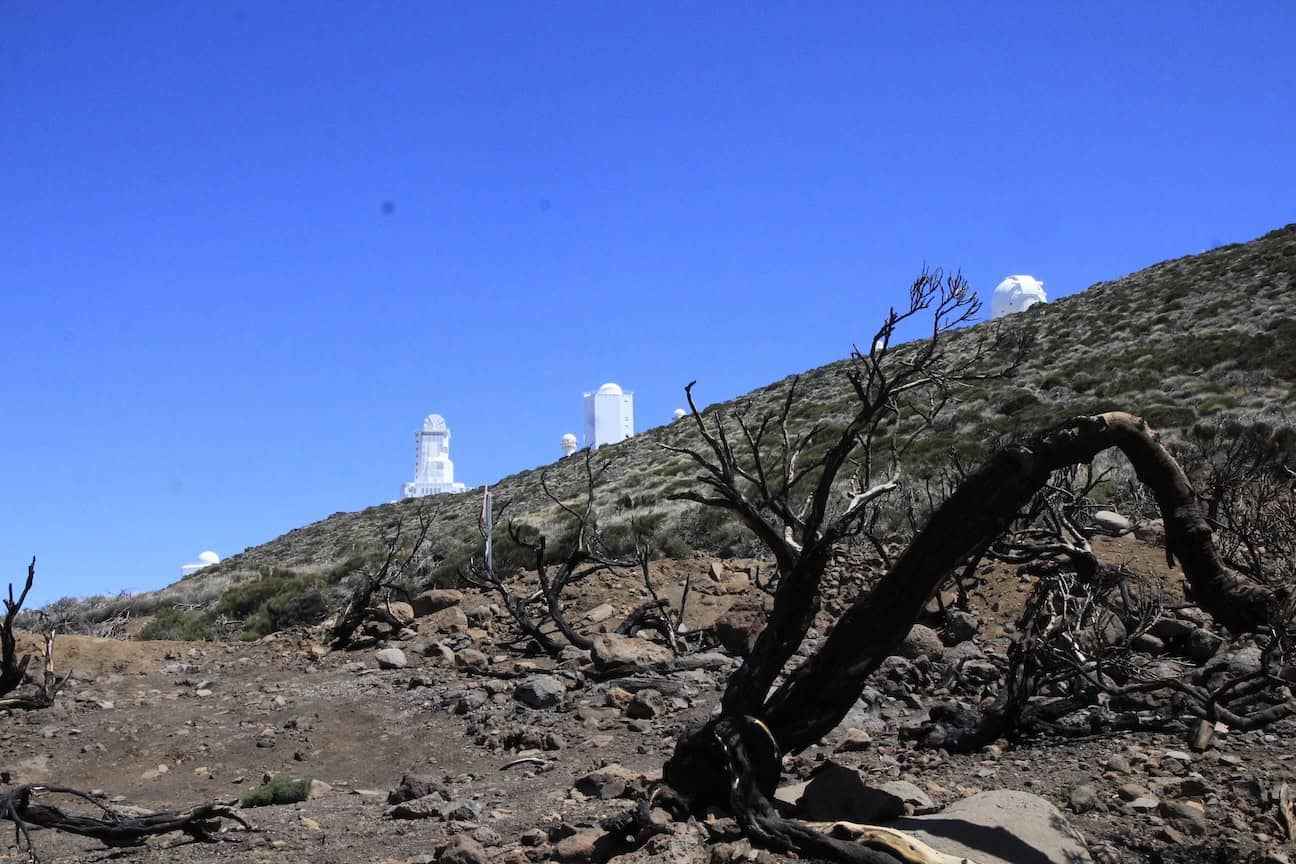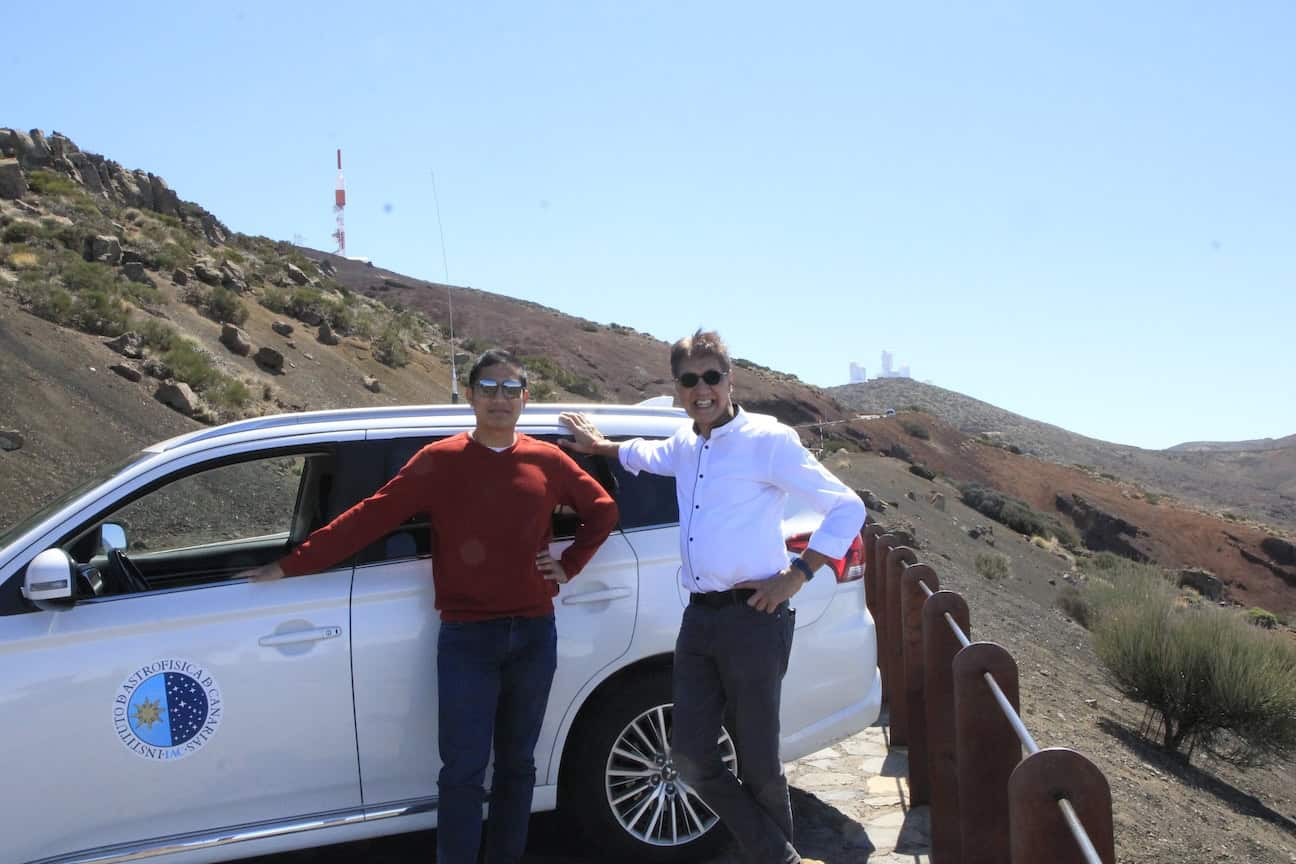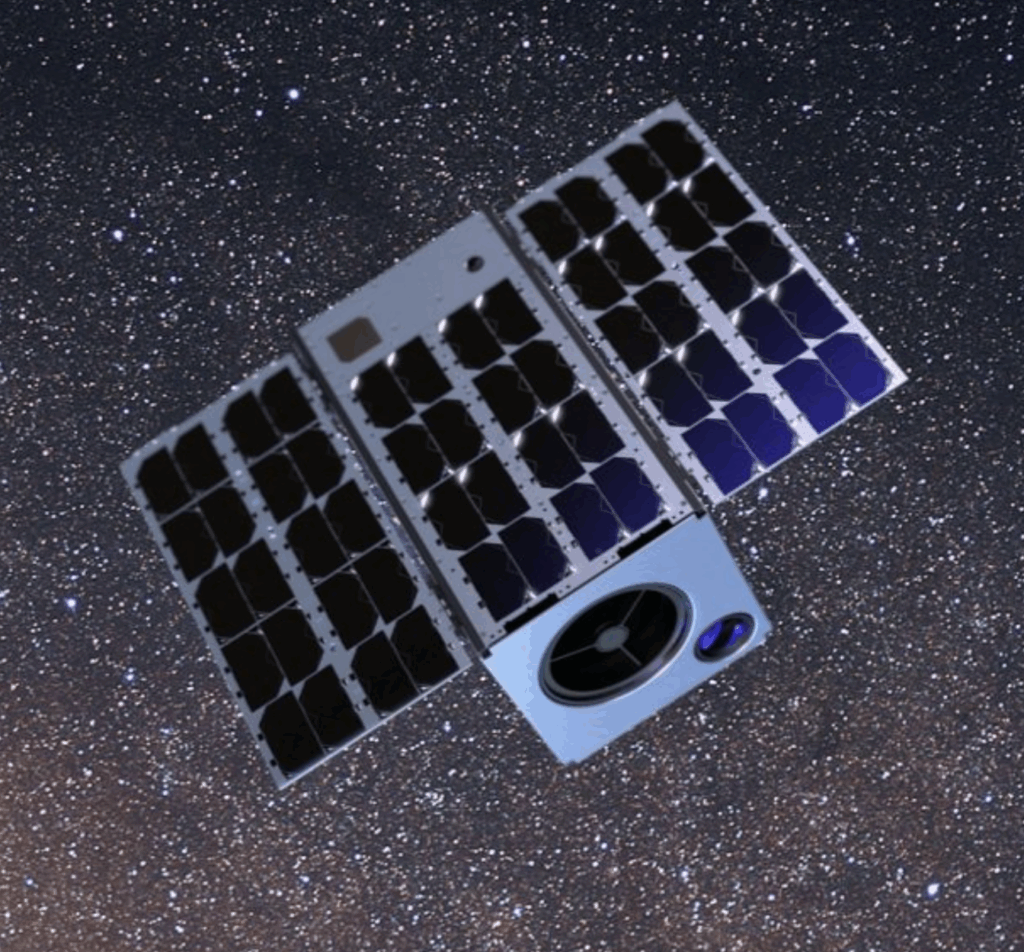This page lists all the programs broadcast on Allfm.org in my series, titled ‘Manchester Science’. This series explores the science being conducted in and around Manchester right now.
33#. 5th August 2025. Gorton Locomotive Works
32#. 22nd July 2025. Olly Thompson Manchester History on YouTube
31#. 8th July 2025: Dame Jocelyn Bell-Burnell on Pulsars and more
30#. 24th June 2025: Friedrich Engels in Manchester with Dr Dean Kerby
29#. 10th June 2025: Britain’s Greatest Pilot. Captain Eric Winkle Brown
28#. 27th May 2025: Exploring the stellar neighbourhood
27#. 13th May 2025: Soaring over the surface of Titan: NASA’s Dragonfly Mission
26#. 29th April 2025:Are we alone and the Breakthrough Initiatives
25#. 15th April 2025: Brown Dwarfs. Failed Stars or successful planets
24#. 1st April 2025: Arthur Schuster and the University of Manchester
23#. 18th March 2025: 1930s Manchester – Displaced Scholars and the Atom Bomb
22#. 4th March 2025: Arthur Clarke and the Challenge of the Spaceship
21#. 18th February 2025: Jodrell Bank and Bernard Lovell
20#. 4th February 2025: China’s Chang ‘E 4 mission. A greenhouse on the Moon
19#. 21st January 2025: Earthrise: Prof. Robert Poole
18#. 4th Jan 2025: Review of 2024: and the work of John Michell
17#. 10th December 2024: Professor Rahul Nair -Graphene
16#. 26th November 2024: William Leitch Scottish Rocket Pioneer
15#. 12th November 2024: The emerging Space Industry in North of England
14#. 5th November 2024: The Day the cosmonaut came to Manchester
13#. 15th October 2024: Rod Woodcock and Aviation in Manchester
12#. 8th October 2024: Brian Harvey connecting rockets and space with Manchester
11#. 17th September 2024: Michael Herbert on Len Johnson
10#. 3rd September 2024: Binary Neutron Stars with Dr Soheb Mandhai
9#. 20th August 2024: Two years in a Gulag with Frank Pleszak
8#. 6th August 2024: Galactic Magnetic Fields with Dr Vasundhara Shaw
7#. 23rd July 2024: Early aviation in Manchester with Frank Pleszak
6#. 9th July 2024: Americans in Manchester with Dr Andrew Fearnley
5#. 25th June 2024: Pulsars and Neutron Stars with Professor Rene Breton
4#. 11th June 2024: Gravitational Lensing and more at Jodrell Bank with Professor Michael Garrett
3#. 28th May 2024: The Moonwalkers. A Journey with Tom Hanks with Chris Riley
2#. 7th May 2024: Exoplanets with Dr Eamonn Kerins
1#. 30th April 2024: What is Science?
All programs from the previous series, Pennine Pioneers of Science, are available here
1. 30th April 2024: What is Science?

Its roots and role in modern society? When did it start? Is it always precise, fixed and never changing? Is it a sign of intelligence? Is it vulnerable to fraud, bias and exploitation? Is it essential for our civilisation?
2. 7th May 2024: Exoplanets with Dr Eamonn Kerins
Dr Kerins from the University of Manchester talks about some of his work and we look at the following themes.
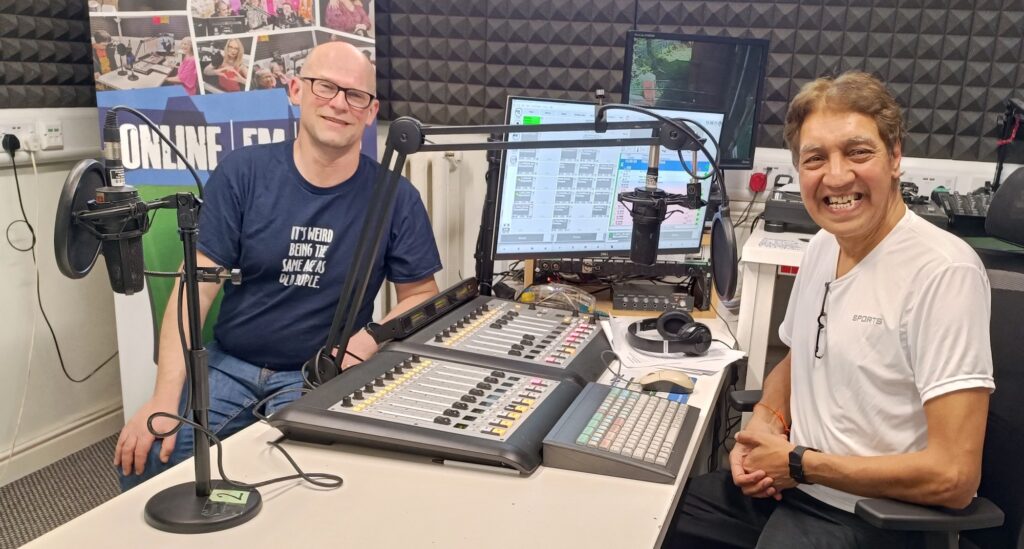
- What are exoplanets?
- What types of instruments are used in the search for exoplanets
- What type of instruments and where are they located that you use in looking for exoplanets?
- Apart from detecting the size and distance from the star – what attributes of exoplanets can be determined from Earth or space-based observatories?
- What are the current and upcoming space missions in the coming years dedicated to this research?
- What chance that some of these distant planets harbour life?
3. 28th May 2024 – The Moonwalkers. A Journey with Tom Hanks with Chris Riley
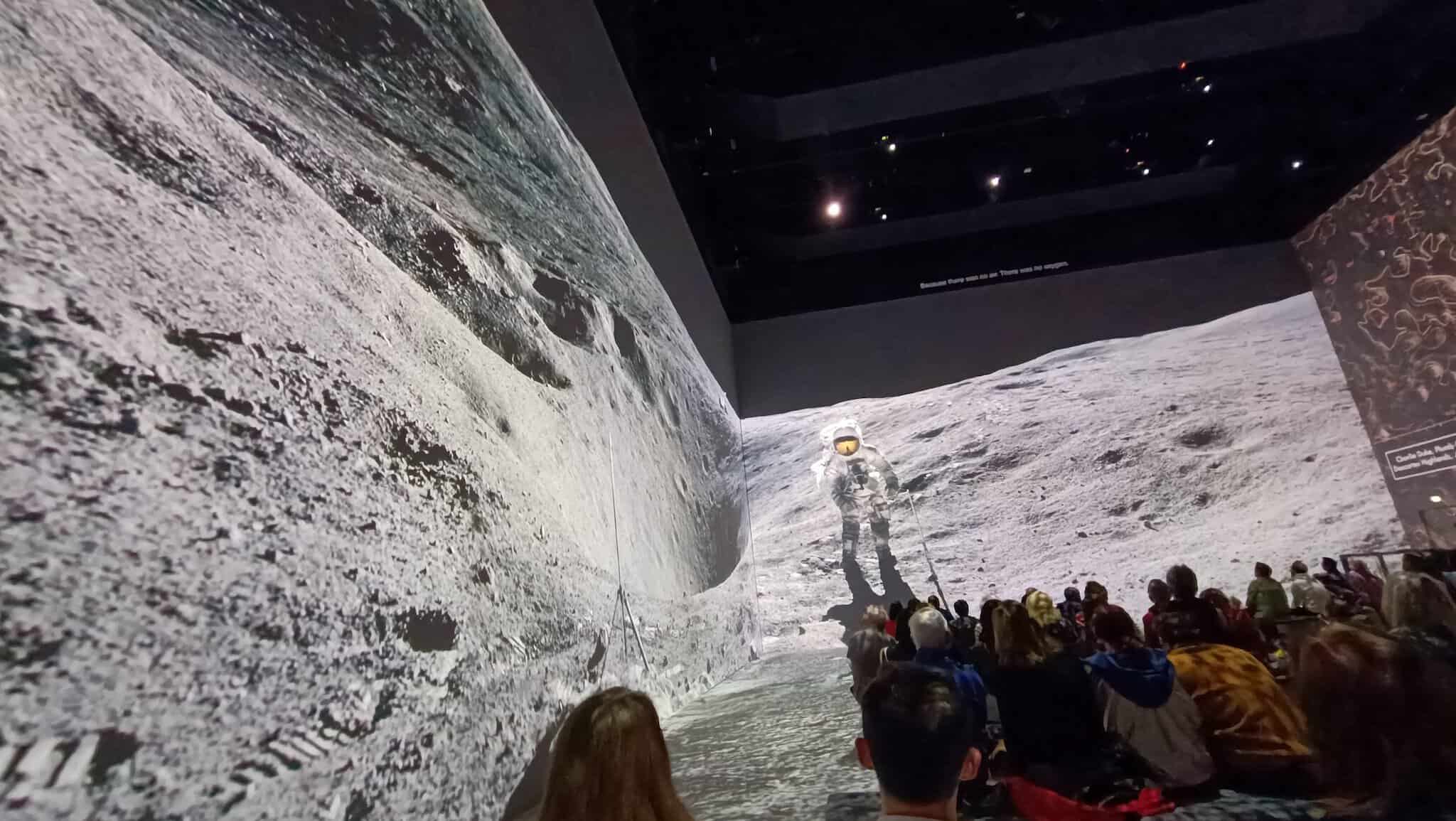
In this conversation, recorded in London Chris Riley talks about his writing, filmmaking and how the idea of The Moonwalkers came about. Parts of this interview were transmitted in my bi-weekly radio program on allfm.org on 28th May 2024.
The script was written by Tom Hanks and Christopher Riley. This unique audio-visual experience of the Apollo story is available only in London and only until 13th October 2024. More images and clips here.
4. 11th June 2024: Gravitational Lensing and more at Jodrell Bank with Professor Michael Garrett

In this episode with Professor Mike Garrett FRS, we discuss some of the many research activities conducted by him, his colleagues and students at the Jodrell Bank Centre for Astrophysics (JCBA) University of Manchester. Many of these activities involve international collaboration and are thus conducted elsewhere around the world and not just in Manchester. One of the big takeaways for me was the work of Mancunian Dennis Walsh who made the very first Gravitational Lensing observation from Jodrell Bank. He was also Professor Garrett’s PhD supervisor. Some of the topics we discussed:
- Recollections of working with Sir Bernard Lovell
- Gravitational Lensing and its origins at Jodrell Bank through the work of Dennis Walsh
- More than 150 individuals from the University of Manchester are associated with the international program the Square Kilometer Array, headquartered in Manchester.
- The global increase in the use of Low-Frequency Array (Lofar) technology in Radio astronomy.
- The USA, Europe and China are looking at the far side of the Moon as a location for radio astronomy
- The role of Brexit and its impact on Britain’s capacity to participate and lead in internationally collaborative programs.
5. 25th June 2024: Pulsars and Neutron Stars with Professor Rene Breton

We discuss only a small part of his current research, including how Pulsars may one day be used as a GPS for interstellar travel. Other topics include
- The ultimate fate of our Sun
- Quasars are distant galaxies with a Black Hole in the centre, so distant that they look like stars.
- Neutron Stars in Binary Systems, accretion discs and “spiders”
- Neutron Stars as a cosmic GPS for future space travellers
- Space-borne Gravity Wave detectors, such as the Laser Interferometer Space Antenna, which NASA plans to launch in the 2030s, will be able to detect a wider range of cosmological phenomena.
- Square Kilometer Array’s role in detecting more neutron stars, pulsars and even pulsars orbiting black holes
- Pulsar Timing Array – a GPS for interstellar travel
6. 9th July 2024: Americans in Manchester with Dr Andrew Fearnley
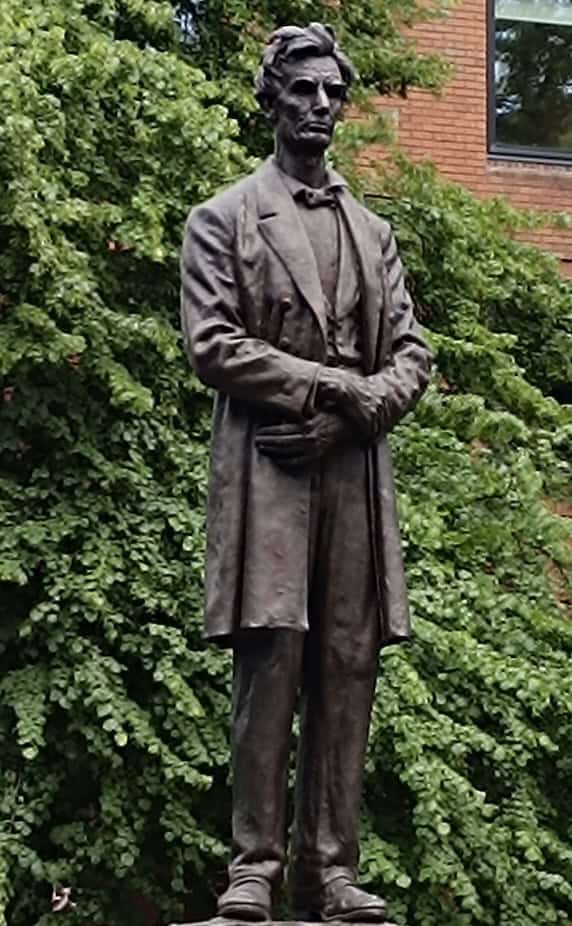
Dr Andrew Fearnley from the Department of American Studies at the University of Manchester, came into the studio for a live discussion on the numerous high-profile visitors, including two former presidents, Ulysses S Grant (1877) and Woodrow Wilson (1918), Why Manchester has a statue of Abraham Lincoln in the city centre and a few of the many writers, artist, campaigners, some of who were former slaves who made their way to champion the cause of emancipation during public speeches at the Free Trade Hall, Manchester Town Hall and the Manchester atheneum. Some of those we discuss include:
- 1771 – Benjamin Franklin – scientist and diplomat
- 1828 – Ira Aldridge – African American Actor
- 1846 – Fredrick Douglas. A former slave who became a leading abolitionist, orator, writer and a statesman
- 1850s – Henry Box Brown. Who escaped by “shipping himself from Virginia to Philadelphia
- 1853 – Harriet Beacher Stowe. Author of “Uncle Tom’s Cabin”. Advocated for the abolition of slavery and social reforms
- 1850-60 – Sarah Parker Remond – a physician and a prominent speaker against racial discrimination
- 1862 Ida B Wells. An investigative journalist, civil rights leader and fierce advocate against lynching
In October 1945, the former Chorlton-on-Medlock Town Hall, on Cavendish St, close to MMU’s All Saints Campus, hosted the 5th Pan-African Congress. Len Johnson, an accomplished Manchester boxer and civil rights advocate, and the Moss Side-based New International Society supported the congress. Many of today’s independent African nations were first envisaged in Manchester, just off Oxford Road, surrounded by the effects of World War 2.
7. 23rd July 2024: Early aviation in Manchester with Frank Pleszak
Manchester has always been associated with the spirit of scientific discovery and technological innovation. Cotton spinning and weaving, steam engines, railways and computing are familiar themes but Manchester also played a leading role in the development of aviation.
Frank Pleszak, an author and volunteer at the avroheritagemuseum.co.uk in Woodford, which celebrates its centenary year with an open day on September 15th, 2024, has written a blog post that includes a map of locations in Manchester identifying many of the events and people of aviation at the beginning of the twentieth century.
In this program, Frank popped into the Allfm.org studio in Levenshulme and shared some of his discoveries about the early days of aviation in Manchester. You can catch up with Frank in person—he gives several talks on his books and beekeeping.
8. 6th August 2024: Galactic Magnetic Fields with Dr Vasundhara Shaw
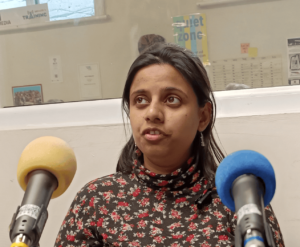
Dr Vasuhandra Shaw is a postdoctoral research Associate at the Jodrell Bank Centre for Astrophysics at the University of Manchester. Her subject of interest is a huge one – galactic magnetic fields! She explains how her work explores the size, origin and structure of the magnetic field of our Milky Way Galaxy.
We also spoke about her interesting journey from Lucknow in northern India, where she completed her undergraduate studies, to Pondicherry in southern India, where many people still speak French, where she completed her first Master’s degree; Paris, where she completed her second, and Berlin, Germany, where she completed her PhD. Astronomer Fred Hoyle and singer Cliff Richards also pop up in our conversation.
I asked what she had noticed first about Manchester (she has been here for less than a year). Her answer will surprise you as much as it did me.
9. 20th August 2024: Two years in a Gulag with Frank Pleszak
Frank Pleszak is a local author, a private pilot, and a volunteer at the avroheritagemuseum.co.uk. Yep—the same Frank who spoke to us on 23rd July about early aviation in Manchester. In this program, Frank talks about his book Two Years in a Gulag, the story of his father’s WW2 journey from the infamous Kolyma gold mine in far East USSR to becoming a coal miner in Pendlebury in Salford.
Our conversation includes Frank’s talks to school kids in Belarus about Manchester, an unlikely 1965 family reunion in Denton facilitated by the Red Cross and a Polish pilot (Władysław Turowicz) who left the RAF in WW2 and headed up Pakistan’s Space Agency Suparco.
You can listen (or download) that or any of my previous programs by visiting astrotalkuk.org/manchesterscience.
You can see more about Frank’s work, including his books and many upcoming public talks at www.pleszak.blog
10. 3 September 2024: Binary Neutron Stars with Dr Soheb Mandhai
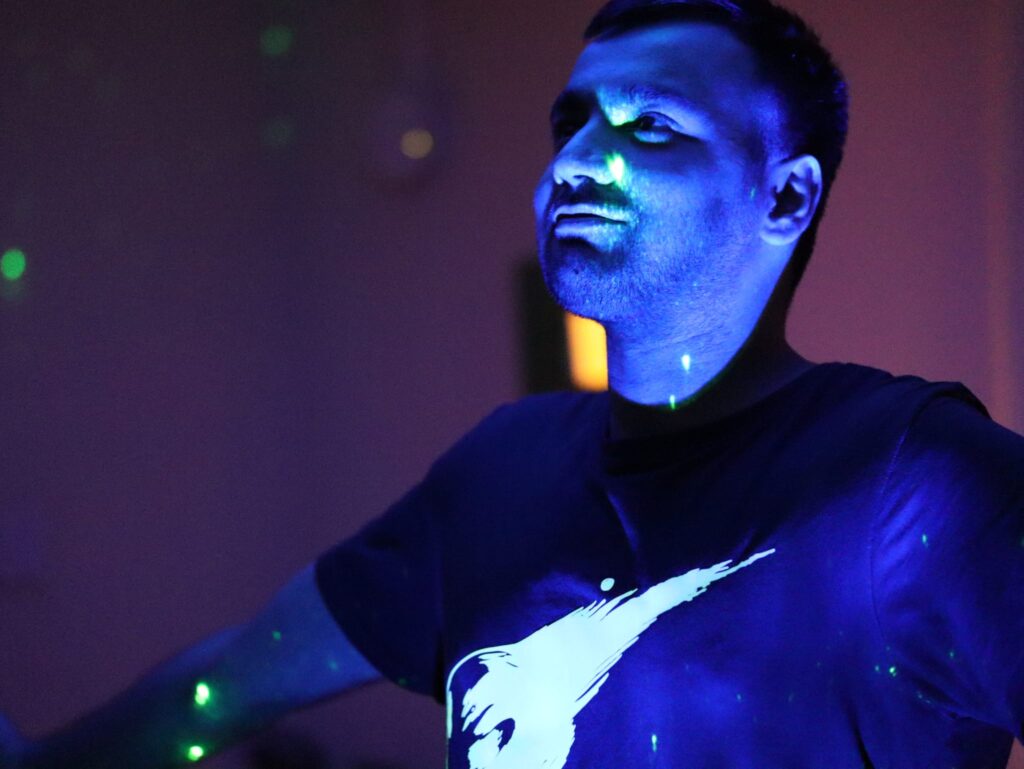
Dr Soheb Mandhai, a post-doctoral research associate at the Jodrell Bank Centre for Astrophysics, investigates neutron stars. Since most stars are binary (two) star systems, it is not uncommon to see neutron stars in pairs or binary systems. That can be a neutron star orbiting either another ‘normal’ star, another neutron star or a black hole. All of these are binary systems.
In our conversation, we discussed the international collaborative nature of his work, how most of it involves him sitting in front of his laptop, developing mathematical models for the orbits of such binary systems, detecting Gravitational Waves and seeing how the orbits evolve and how the binary systems move through the galaxy (in our own Milky Way and other distant galaxies).
In addition to his astrophysics, Dr Mandhai explores his science through digital art.
11. 17th September 2024: Michael Herbert on Len Johnson

This program is about someone you probably have never heard of. Len Johnson was born in 1902 and died in 1974. He is buried in Southern Cemetery. Andy Burnham, mayor of Greater Manchester, said of him in 2020, “Johnson’s story was one that ‘hasn’t been told enough”. In this program, I’m going to do my bit.
Leonard Benker Johnson was born to a white Irish mother and a black father from Sierra Leone in Clayton East Manchester in 1902 and died in Oldham in 1974. He is best known for his accomplishments as a boxer. His boxing took him abroad to Denmark, South Africa, Belgium, and Australia.
After WW2, he participated in the Pan-African Congress held in Manchester in October 1945. With the profound geopolitical shifts brought about by the end of WW2, he saw the potential of a new egalitarian world order. He founded The New International Society in Moss Side, Manchester with friends Syd Booth and Wilf Charles. Its primary objective was to “promote and encourage respect for human rights and for fundamental freedom for all without distinction as to race, sex, language or religion”.
He brought his friend Paul Robeson (1940 film Proud Valley on Youtube) to Manchester to speak against racial inequality and challenge the colour bar and racism of which he had been a victim throughout his life. To learn about Len Johnson’s fascinating life and work, I spoke to Michael Herbert, the author of Johnson’s 1992 biography “Never Counted Out.”
12. 8th October 2024: Brian Harvey connecting rockets and space with Manchester

In this program, author Brian Harvey recounts the story of the space race in the early days and his most recent book – Japan in Space. Past Present and Future. He covers the development of rocketry here in the Northwest England, the Cold War and the role of Jodrell Bank and the race to the Moon in the past and the one emerging now to establish long-stay lunar basis. We learn about the British Interplanetary Society was founded in Liverpool in 1933. The short-lived Manchester Interplanetary Society was founded in 1936 by Eric Burgess in Clayton, East Manchester.
We also learn a little about USSR’s 1968 mission to the Moon and back. Zond 5 was the first time that living creatures (including two tortoises) went to the Moon and returned. The little-known story of the unsuccessful mission of Luna 15, a USSR mission to return lunar samples to Earth. It crashed on the Moon whilst Neil Armstrong and Buzz Aldrin made their short but historic moonwalk.
13. 15th October 2024: Rod Woodcock and Aviation in Manchester
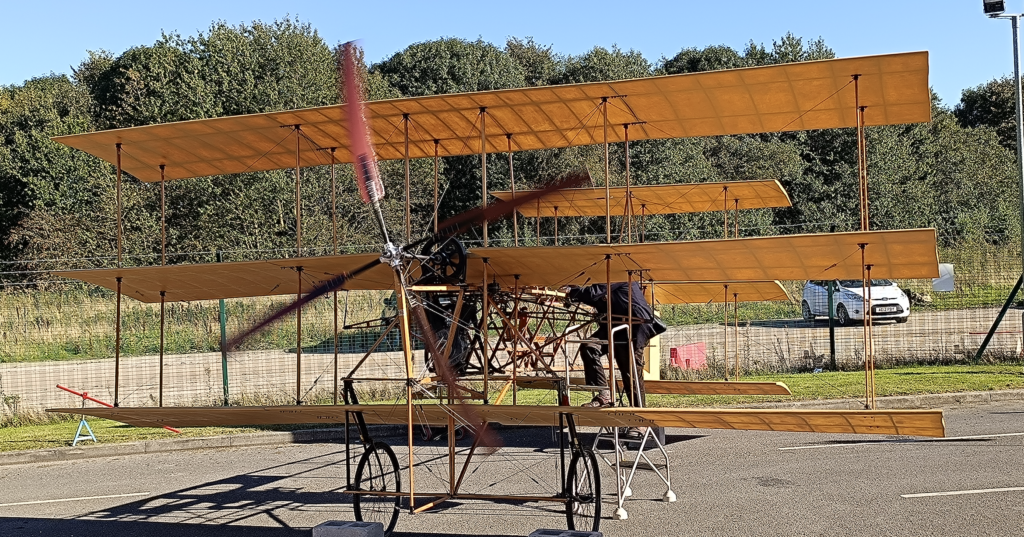
When it comes to innovations in transport, Manchester has always been at the forefront. The role of the canals, for example, the Bridgewater Canal and especially the Manchester ship canal, was transformative. The success of the world’s first railway journey—between Liverpool and Manchester—spread first across Britain and the globe. A form of transport that is still used by billions of people today.
But Manchester’s early role in aviation is not well known. For example, the first factory to make aircraft in Britain by Alliott verdon-Roe opened in Ancoats in 1910. The first scheduled flight in Britain operated from Manchester to Blackpool via Southport in 1924. Frank Pleszak has documented further details of Manchester’s aviation history
It was at the Avroheritage Museum that I spoke to Rod Woodcock, who started as an apprentice there in 1961 and the role Avro aviation Ltd that Verdon-Roe setup in Woodford in 1924.
14. 5th November 2024: The Day the cosmonaut came to Manchester
Exactly three months after his historic spaceflight, Yuri Gagarin, a major in the USSR Airforce visited London and Manchester. He arrived in London on 11th July 1961 and visited the USSR Trade fair in Earls Court and then landed at Manchester Airport at 10am on the following day.
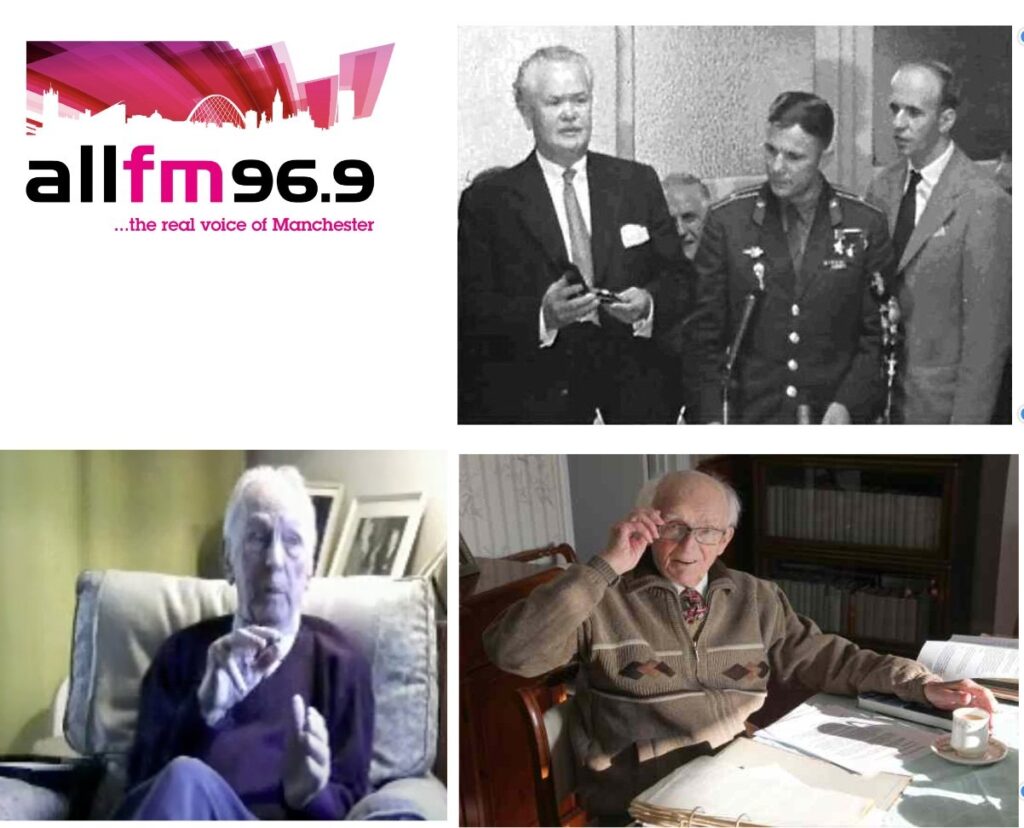
Why did he come to Manchester? Before joining the Soviet Airforce, he had been a foundry man. He had been invited by the Amalgamated Union of Foundry Workers which had its headquarters on Chorlton Road in Old Trafford.
During this “day-trip” to Manchester he would visit this Union HQ, Metropolitan Vickers in Trafford Park and conclude with a formal reception at Manchester Town Hall. In this program, you will hear clips recorded in 2011 for my 2011 book Yuri Gagarin in London and Manchester. The contributors are
Reg Turnill – Aerospace correspondent
Dame Kathleen Ollernshaw
Marjorie Rose
Stanley Nelson
Captain Eric Brown
Staislava Sajawizc
The audio of Gagarin speaking at the AUFW HQ and Manchester Town Hall come from the Northwest Film Archive video you can see here.
15. 12th November 2024: The emerging SpaceIndustry in North of England

Space technology has not only transformed the quality of our lives but also the national economy. Many jobs already rely directly or indirectly on space technology. This sector is growing.
The quality of lives we lead now was not possible a decade ago. Today, we can order a cab, knowing exactly how long and how much it will cost; we can make a purchase today and track its delivery tomorrow, and we can plan a long journey knowing in advance about weather and traffic conditions along the way in real-time. That is all possible with spacecraft in orbit and a ground infrastructure to support them.
Is Manchester and the north of England doing much in this new “space age”? If so, what?
Alan Cross is the North West Space Cluster Manager. He speaks about the space sector commercial opportunities in the North of England.
16. 26th November 2024: William Leitch Scottish Rocket Pioneer
When it comes to the pioneers of rocketry, tradition has it that it was Tsiolkovsky, Goddard and Oberth. in this episode, author Robert Godwin talks about William Leitch from Scotland. Leitch was writing about the principles of rocket propulsion and space travel in 1861. Decades before Tsiolkovsky. Over the last few years, Rob has been researching Leitch’s story and published a book – William Leitch Presbyterian Scientist & The Concept of Rocket Space Flight 1854-1864.
You can listen to the longer version of this interview here https://astrotalkuk.org/episode-104-williamleitch/
17. 10th December 2024: Professor Rahul Nair -Graphene
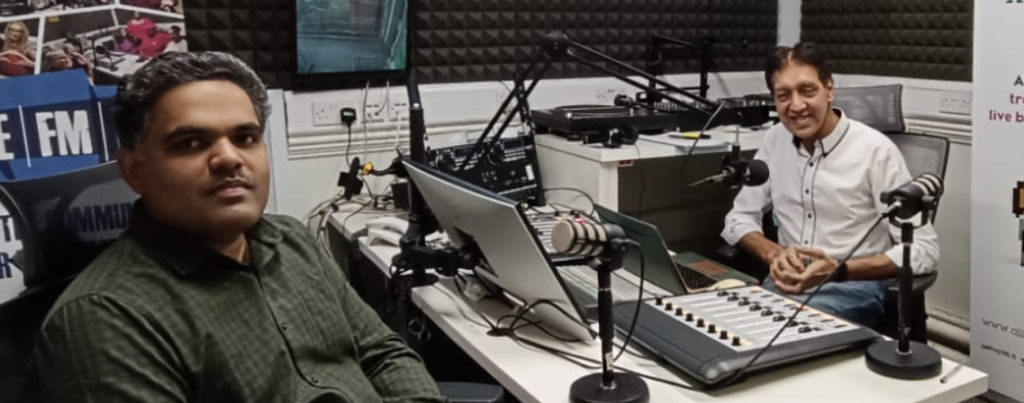
Graphene, isolated in 2004, has many properties, including exceptional strength, electrical conductivity, thermal conductivity, transparency and flexibility. When it was first announced, Graphene came with high hopes for applications and products in communication, space, military, medical and the environment.
Rahul Nair, professor of Material Physics at the University Manchester is based at the National Graphene Institute. His research focus is on developing novel 2D materials (including Graphene) and specialised nano filters for water, organic solvents, gases and fuel cells.
Professor Nair popped into the studio at allfm to share some details about what Graphene is and some of its remarkable properties. While huge progress has been made in developing Graphene products, the commercial risks of industrial-scale production and detailed research essential to identified commercial opportunities at industrial scales are still work-in-progress. In addition, Carbon-based Graphene is not the only 2-D “super material”. Boron, Lead, Silicon and even Gold can be used to produce this 2-D material.
We also spoke about his Sir Andre Geim who was his Ph.D. supervisor and now a colleague at the
If you listened to the live show you will note that he last 12 minutes is missing in the recording below. I have manually added the final 6 minutes of summary, but the other 6 minutes remain a mystery. If it does show up – I will update.
18. 4 Jan 2025: Review of 2024 and the work of John Michell
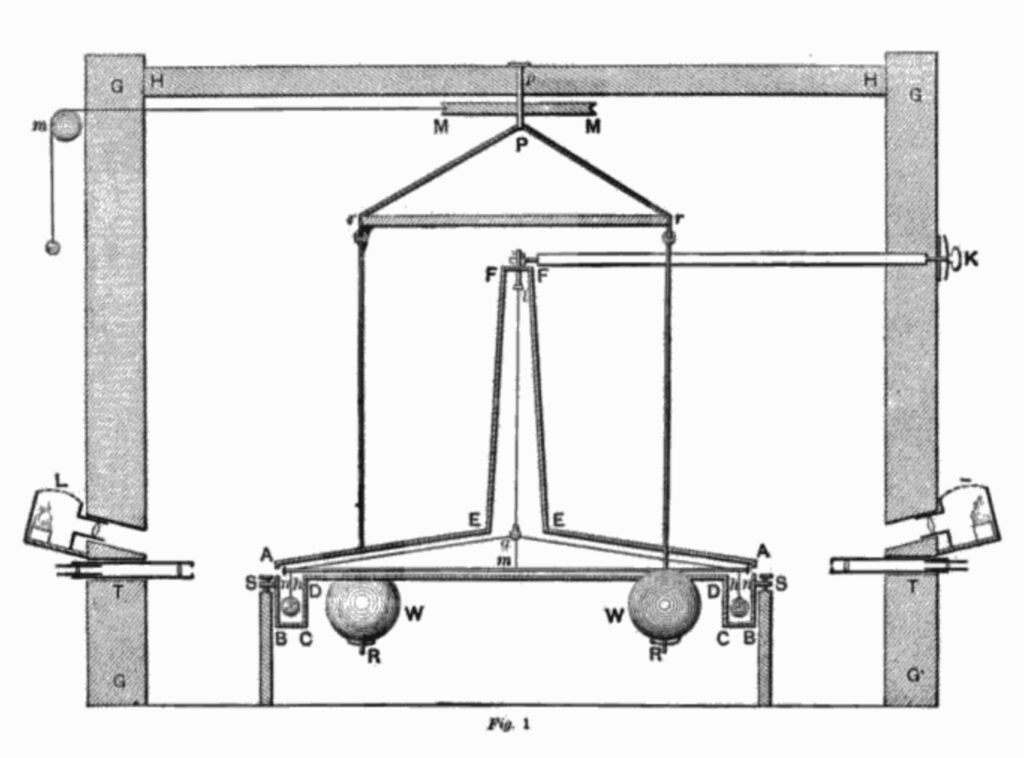
John Mitchell arrived in Dewsbury at the Thornhill Parish church in 1767. His work is not well known, probably because the range of topics he investigated was broad – magnetism, distances to the stars, black holes and the mass of the Earth. Many of his Royal Society publications are available here. Also, perhaps his concepts of magnetic fields, interstellar parallax, and black holes were so advanced that his contemporaries could not contemplate them. In this summary on the life and work of John Michell, I have not covered his work on Earthquakes or building large telescopes or his meetings with Benjamin Franklin, Joseph Priestly, Henry Cavendish and William Herschell. There is much more to his life and work.
Archibald Geike’s 1918 book A Memoir of John Michell is available for download here
I have also used some publications by science writer Chris A Butlin.
Next time – Author Prof. Robert Poole is live in the studio speaking about his book Earthrise: How Man First Saw the Earth
19. 21 January 2025: Earthrise: Prof. Robert Poole
Professor Robert Poole, highlights the impact of the iconic “Earthrise” photograph taken during the Apollo 8 mission in 1968, which many believe served as a catalyst for the environmental movement and a shift in consciousness towards a unified planetary perspective.
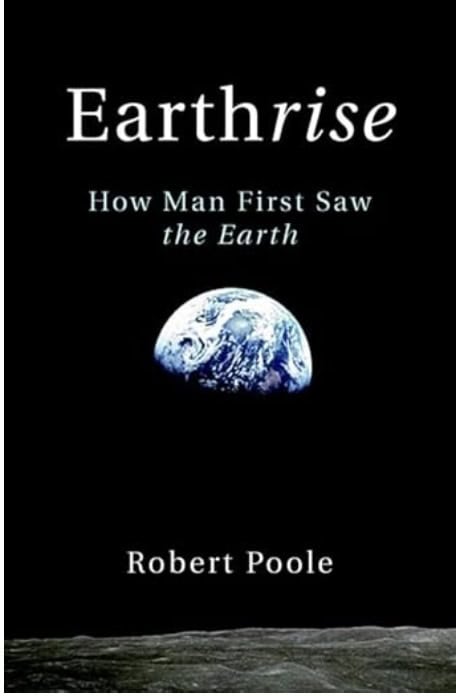
The book traces historical periods, from ancient Greek philosophers to science fiction writers of our times, artistic depictions, literary works, and more recent scientific advancements that shaped our understanding of Earth.
The book explores the cultural and philosophical implications of this shift, particularly the rise of “Spaceship Earth” and “Gaia” concepts, emphasizing the interconnectedness of humanity and the need for environmental sustainability.
The NASA audio clips came from Earthrise in 4K from NASA Goddard and NASA’s Chief Scientist and Senior Climate Advisor Dr. Katherine Calvin’s interview with Bill Anders in 2023.
Nextime – 4th February 2025 Professor Gengxing Xie from the University of Chongqing in central China and the 2019 experiment of the first greenhouse on the Moon
20. 4 February 2025: China’s Chang ‘E 4 mission. A greenhouse on the Moon

Dean of the Institute of
Advanced Technology at
Chongqing University
On Thursday, 3rd January 2019, some water was added to some seeds in a tiny greenhouse. The seeds, cotton, potato, Rape and Arabidopsis sprouted. Fruit fly eggs hatched and consumed the yeast. The carbon dioxide produced by the flies and yeast was used by the plants to generate oxygen.
That oxygen was used by the yeast and flies. A perfect balance through photosynthesis. The sort of balance we are all experiencing right now. Just over a week later, on Saturday, the 12th of January 2019, the experiment ended.
Experiments like this have been conducted many times before. What was special about this one was that it was done on the surface of the Moon.
The guest on this program is the Chief Designer of this Bio experiment carried to the Moon on Chang’e 4 in January 2019. In this program, you will hear directly from Professor Xie Gengxin from Chongqing University in central China. The interview was recorded in Milan during the International Astronautical Congress 2024.
Chang ’E 4 lunar lander and Rover mission was the 4th mission to the Moon from the Chinese National Space Agency. It was part of China’s lunar exploration program that began with the launch of Chang’e 1 and 2 to lunar orbit in 2007 and 2010. Chang’ E 3 and 4 (in 2013 and 2018) included a lander and a rover reaching the lunar surface.
21. 18 February 2025: Jodrell Bank and Bernard Lovell
Jodrell Bank 75m diameter fully steerable radio telescope, located in the rural northwest, is an established icon of Manchester and a UNESCO World Heritage Site. The first detection of evidence of gravitational lensing is one of its many scientific discoveries.
In this program, you will hear excerpts directly from Bernard Lovell, an oral history recorded in 2007 by https://www.webofstories.com/ . How the project was realised, role during the Cold War and about his plans for an even larger (400ft diameter) in Wales near Welshpool.
But did you know it was responsible for tracking the Sputnik 1 carrier rocket, was referred to as “our great radio-telescope at Jodrell Bank” in the House of Commons on 29 October 1957 and receiving, decoding & publishing the first picture of the lunar surface transmitted from the surface of the Moon in 1966?
22. 4th March 2025: Arthur Clarke and the Challenge of the Spaceship
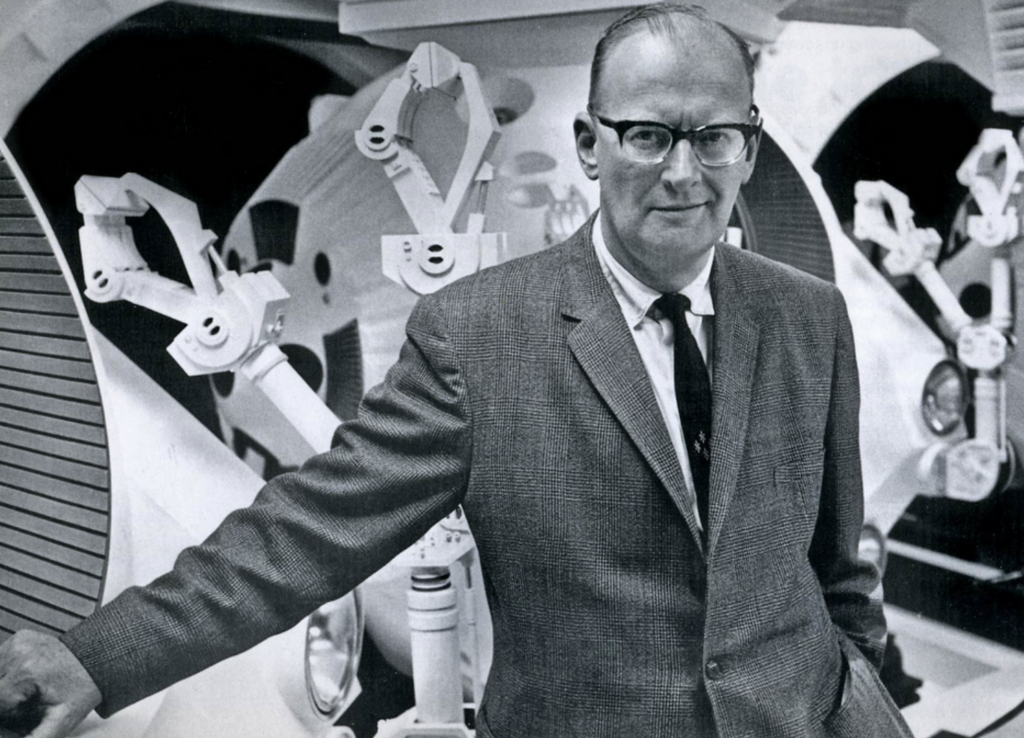
I start the program recalling his visit to Longsight in Manchester in 1938. Not mentioned in the program but he had another connection with the northwest of England.
In 1940 he was based in Colwyn Bay in North Wales working for the Ministry of Food. His initial attempt to join the RAF failed because “absence of teeth and presence of spectacles”.
In the program, I am joined again by Professor Robert Poole, historian from the University of Central Lancashire. We discuss Clarke’s 1946 seminal paper “The Challenge of the Spaceship” in which Clarke looks at how nuclear power and use of rockets will transform the 20th century.
23. 18th March 2025: 1930s Manchester – Displaced Scholars and the Atom Bomb
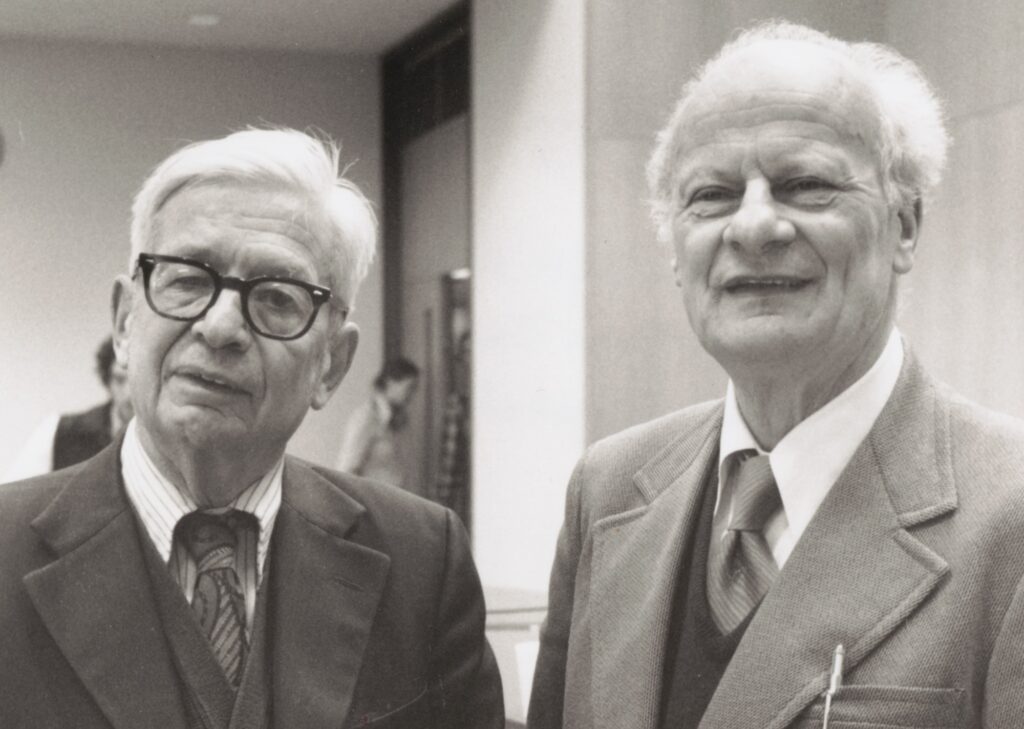
Of the thousands of refugees displaced by the emergence of fascism in Germany in the 1930s, two scholars arrived in Manchester in 1933. They went on to make their lives in Birmingham, England and New York in the USA but made a profound contribution in atomic physics but will probably be known for their contribution in the Manhattan project to develop the first Atomic Bomb during WW2.
Rudolf Peierls was one of the authors of the Frische-Peierls memorandum, a classified document that described quantitatively that an atomic bomb was theoretically and practically feasible. Both had escaped Hitler’s Germany and arrived in Manchester as refugees. Hans Bethe joined Peierls in Manchester in 1933, was also awarded the Noble Prize for Physics in 1967. Peierls was Knighted in the 1968 Queens Birthday honours list.
Some of the sources used in this program include the American Association of Physics, Charles Weiner and the Oral History of Physics, Imperial War Museum, Web of Stories and documents including The Frisch-Peierls Memorandum, Rudolf Peierls biography Bird of Passage.
24. 1st April 2025 Arthur Schuster and the University of Manchester
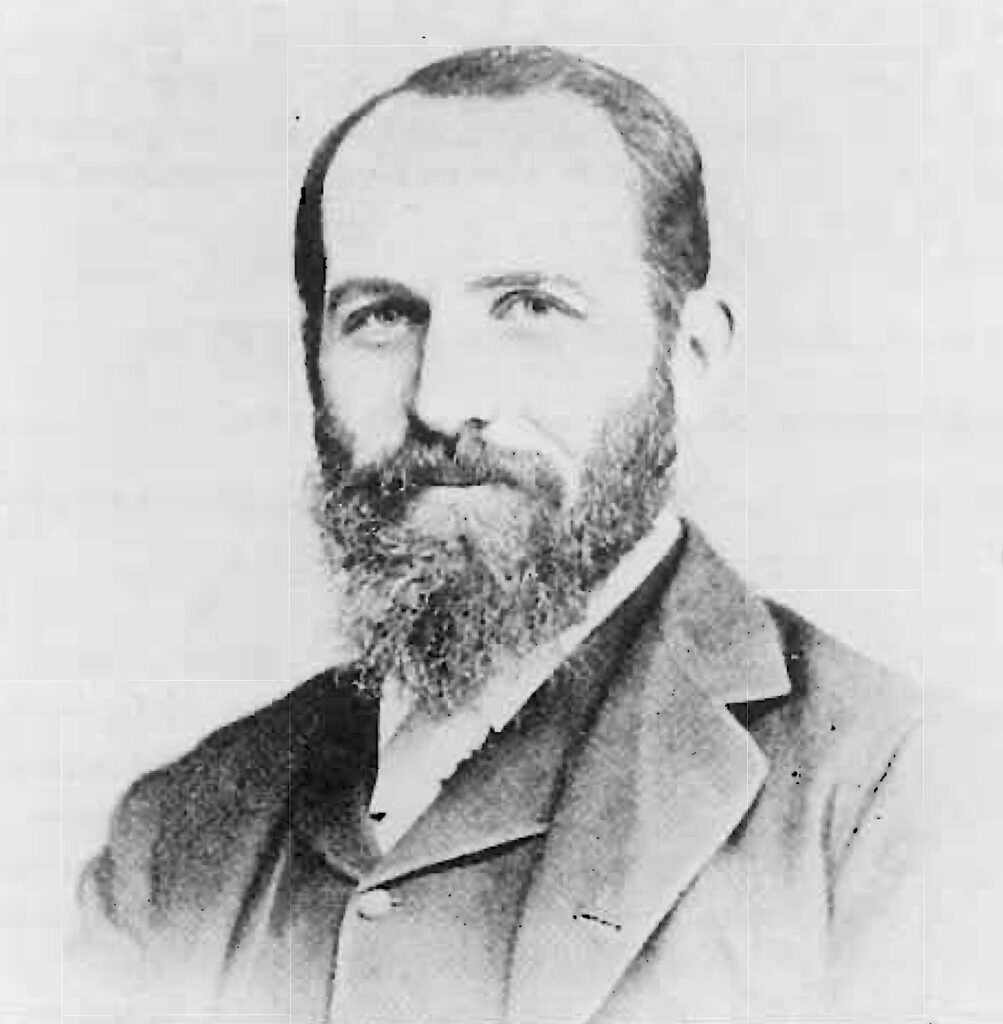
Arthur Schuster, a German-British scientist, arrived in Manchester in 1869. First to study at the University of Manchester and then teach. From 1881, he served as the Langworthy Professor in Physics at the University of Manchester for over a quarter of a century. Apart from his scientific contribution, he made his mark in the university’s culture of open, inclusive, research-centric education, which persists to this day.
Some of the sources I used include
- 1991 Sue Coates Manchester’s German gentlemen: immigrant institutions in a provincial city 1840-1920
- 1932 Schuster, Sir Arthur: Biographical Fragments
- 2024 University of Manchester (YouTube): Professor Sir Arthur Schuster and his legacy
Who was he? Why did he end up in Manchester, and what was his scientific and educational legacy?
25. 15 April 2025 Brown Dwarfs. Failed Stars or successful planets
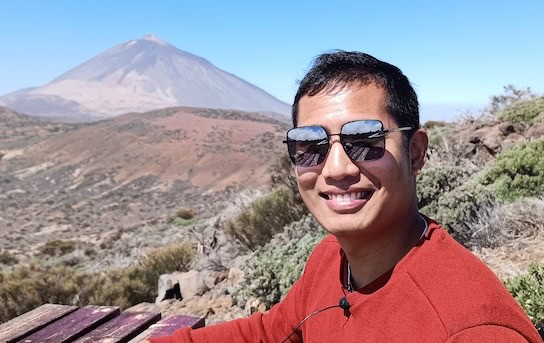
This episode was recorded at the Mount Teide Observatory with Jerry Zhang, a final year PhD student under the supervision of Professor Eduardo L Martín and Dr Nicolas Lodieu at the Instituto de Astrofísica de Canarias. This class of object had been predicted for a long time but was first detected in 1995 from an observation conducted at the Mount Teide Observatory by a team of observers, including Jerry’s supervisor, Eduardo L Martín.
Jerry’s research focuses on Brown Dwarfs. Astronomical objects are somewhere in between stars and planets. Typically, their size is that of Jupiter, but with a mass of between 15 and 70 times that of Jupiter. With such low mass (less than 0.08 of our sun), they can never reach the temperature or pressure in their cores necessary for nuclear fusion. They can never shine like our sun. They remain dim and small (brown and dwarf) throughout their lifetime.
Intriguingly, we concluded our conversation with a thought about where the first detection of extraterrestrial life may be discovered. This interview was recorded 2.4km above sea level at the Teide Observatory. It was occasionally windy – as you will hear.
26. 29th April 2025:Are we alone and the Breakthrough Initiatives
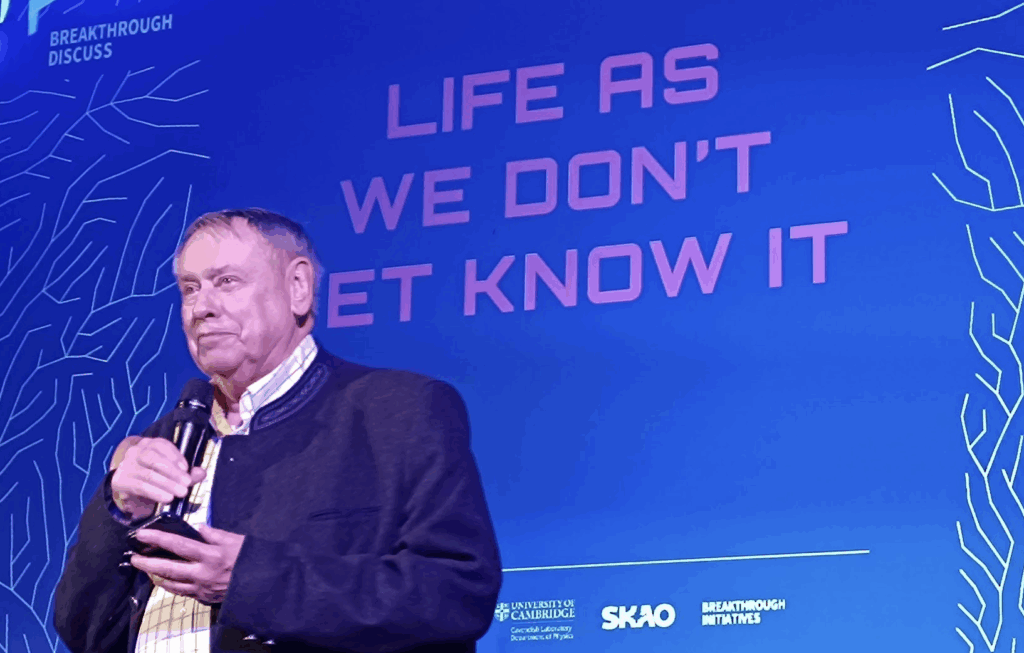
For almost 70 years, astronomers have been listening to radio signals from beyond the Solar System, searching for “techno-signatures.” The data collected has increased many folds. Innovative technologies of digital signal processing and artificial intelligence analyse the data in ways never done before. Still, no clear, unambiguous techno or biosignatures have been detected.
You may have heard the announcement about an exoplanet (K2-18b) capable of supporting life, 124 light-years away. The data appears promising, but it is far from definitive.
A two-day Breakthrough Discuss conference held on 23rd and 24th April 2025 in Oxford England, took stock of the latest developments through three main sessions: “Forms of Non-Terrestrial Life”, “The Nature of Consciousness and Intelligence”, and “Detecting Life As We Do Not Know It”.
Breakthrough Discuss was overseen by the Chairman of the Breakthrough Foundation, in this interview, Dr Pete Worden. A former Brigadier. General, astrophysicist, professor and director of NASA Ames Research Centre talks about the Breakthrough Initiatives.
27. 13th May 2025: Soaring over the surface of Titan: NASA’s Dragonfly Mission
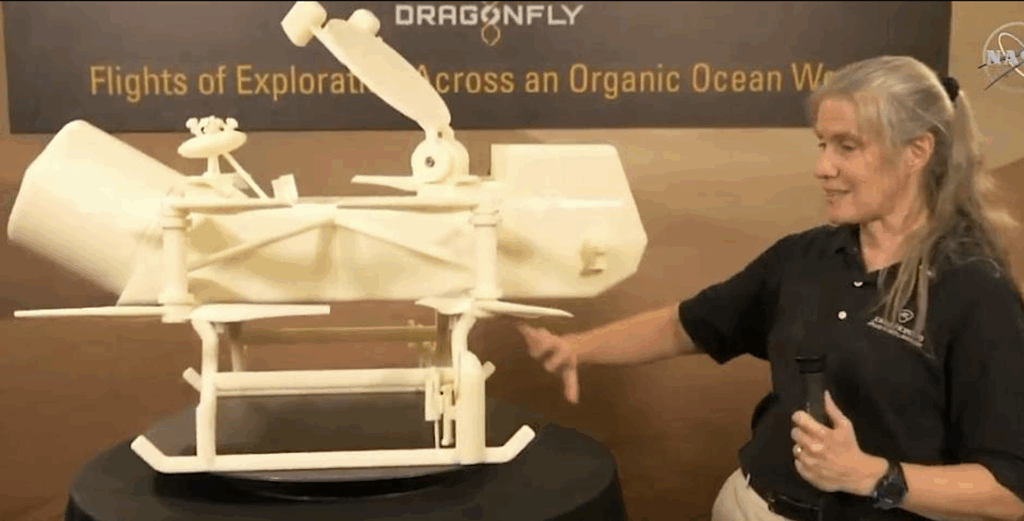
It is December 2034. A spacecraft launched from Earth in July 2028, enters Titan’s atmosphere at 5km/s. Around 2 hours later, it softly lands on the surface at less than 1m /s. Over the next three years, NASA’s Dragonfly mission, a rotorcraft the size of a small car, will chemically analyse the Titan’s atmosphere, ground and a little of its subsurface.
In this interview recorded on 24th April 2025 in Oxford during #BreakthroughDiscuss, Dr Elizabeth Turtle, Principal Investigator, on the Dragonfly mission to Saturn’s largest mission – Titan.
Some of the topics Dr Turtle covers include
- Dragonfly’s scientific objectives to explore complex organic chemistry and understand the steps that occurred before biology took hold on Earth, helping us learn about our own chemical origins.
- Dragonfly isn’t just landing; it’s designed to fly from place to place. Over its nominal mission lifetime of a little over three years, it expects to visit 30-40 different landing sites.
- Flying on Titan is actually easier than flying on Earth because its atmosphere is four times denser and its gravity is only one-seventh of Earth’s.
- An overview of the Dragonfly – large rotorcraft, technically an X8 octacopter, roughly the size of a small car or the large Mars rovers like Curiosity and Perseverance.
- Dragonfly is powered by an MMRTG, a Multi-Mission Radioisotope Thermoelectric Generator, which provides both the electricity and the crucial heat needed to keep the lander’s interior warm in Titan’s frigid environment.
The Cassini-Huygens mission that arrived at Saturn/Titan in 2004 was launched in 1997. Saturn orbits the sun every 30 years. If Dragonfly misses the July 2028 launch window, there may be another thirty-year wait!
28. 27th May 2025: Exploring the stellar neighbourhood
Just as the Moon was the first stepping stone for our interplanetary exploration, our nearest star, the Alpha Centauri System will inevitably become our stepping stone for our Interstellar Journey. That is in the distance. A new mission, The Toliman Space Telescope, is launching soon and will target the Alpha-Centauri System from Earth orbit.
The Toliman mission is a fairly innovative space mission primarily designed to survey our stellar neighbourhood for Earth-equivalent planets. Toliman is unique for several reasons. The 12.cm diameter telescope is the only scientific instrument built on a low-budget 16U CubeSat, using off-the-shelf components as possible and employing commercial ground stations.
It will use three unique innovations to attain high-precision measurements 1. a Diffractive Pupil Optical Mask 2. High-Precision Tip-Tilt System with fine-steers or fine-points the telescope to achieve the required 1-2 arcseconds pointing accuracy and reduce jitter 3. A novel AI-powered software called dLux running onboard a custom computer on the satellite will preprocess data before it is downlinked.
This interview was recorded with Toliman Project Manager Dr Karel Valenta during the Breakthrough Discuss conference in April 2025 in Oxford, I learnt a little about the Toliman Space Telescope.
29. 10th June 2025: Britain’s Greatest Pilot. Captain Eric Winkle Brown
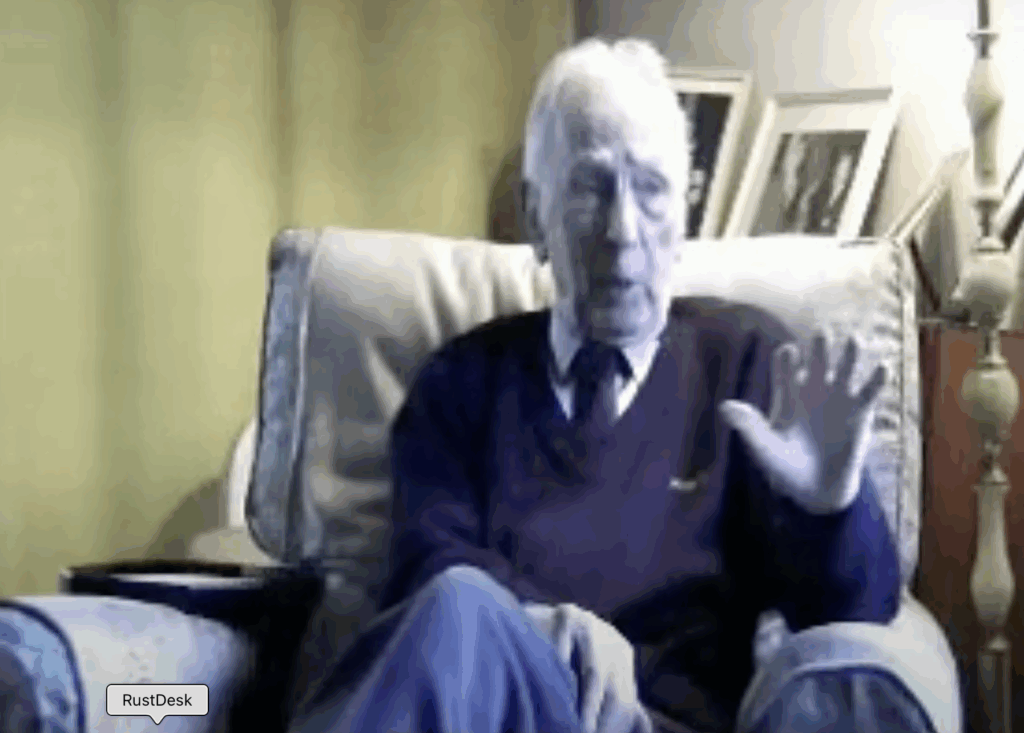
In 2011 I visited Captain Eric Winkle Brown to record an interview on his one-to-one meeting with Yuri Gagarin on 13th July 1961 at the Admiralty in London. This was a day after Gagarin visited Manchester. After that discussion, the interview continued. Captain Brown spoke of his fond memories of a German WW1 pilot Ernst Udet who encouraged him to fly. During the war, he excelled as a test pilot and became the chief test pilot at Farnborough.
After WW2, using his fluent German language skills he interrogated Hermann Goering, Hanna Reitsch and Wernher von Braun. He spoke of a mission to Germany immediatly after the war to acquire German aviation technology. Following a secret UK/USA deal, Britain passed its research on supersonic aviation to the USA and cancelled the Miles M.52 program. Had this deal not gone ahead, Eric Brown would have been the first to break the sound barrier in 1946, instead Chuck Yeager claimed that record in 1947. He recalls that and many other stories in the interview recorded in his home in January 2011.
30. 24th June 2025: Friedrich Engels in Manchester with Dr Dean Kerby
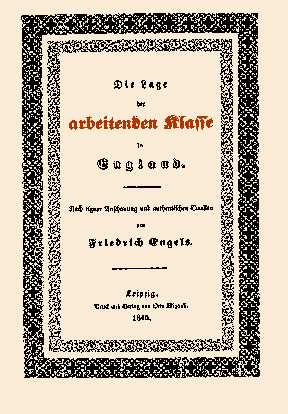
Manchester 180 years ago, as captured in a book first published in 1845. It was titled “The Condition of the Working Class.” It was written by a 24-year-old man from Germany with radical ideas, called Friedrich Engels.
He refers to Manchester of 1844 as the “richest city of God’s Earth” and contrasts that with the living conditions for some people, “night after night, winter after winter, women—outcasts from society—are rotting from famine, filth, and disease”. T
Dr Dean Kerby has researched the work of Engels and written a book, Angel Meadow: Victorian Britain’s Most Savage Slum. He came into the allfm studio to discuss his complex characteristics and contribution. Recording is available below.
31. 8th July 2025: Dame Jocelyn Bell-Burnell on Pulsars and more
Recorded in Oxford on 18th June 2025, Dame Jocelyn Bell-Burnell talks about
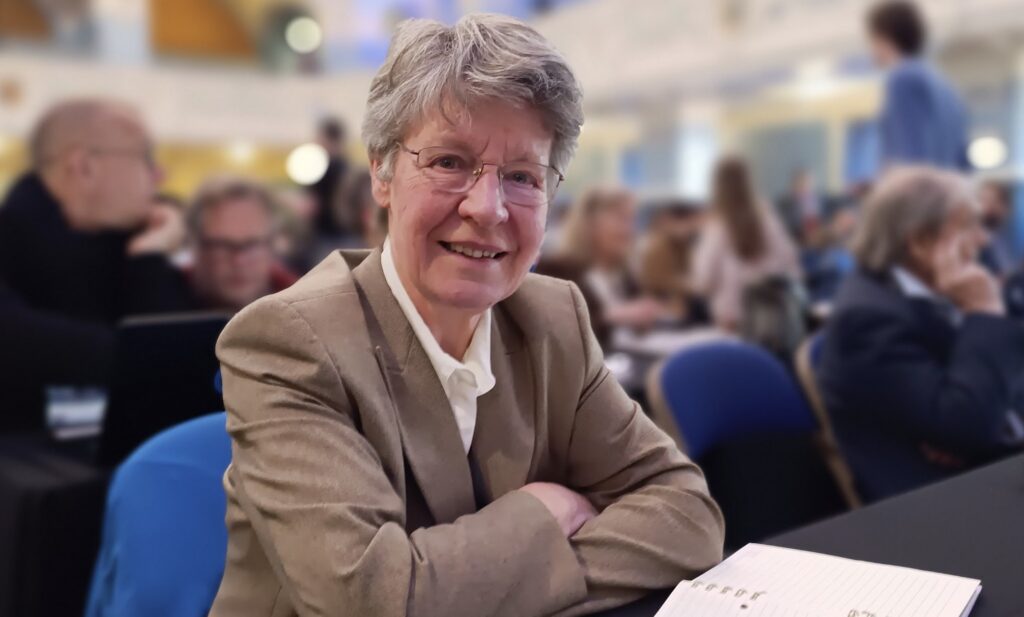
- Interplanetary scintillation array – the instrument that led to the groundbreaking discovery of Pulsars in 1967
- She explains why she ended up in Cambridge rather than at Jodrell Bank in Manchester.
- The importance of support from her parents for higher education and scientific research.
- Her recollections of building the instrument (that Interplenatry Scintillation Array) and analysing the data that came from it.
- The persistent sexism, discrimination and unconscious bias she continues to champion today.
- Her long-term devotion to advocacy for women in science
- Her importance of her Quaker principles and her interest in poetry
32. 22nd July 2025. Olly Thompson Manchester History on YouTube

Ollie Thompson, who founded the YouTube Channel, talks about exploring the History of Manchester – its people, places and achievements through the medium of video. Ollie produces some high-quality, deeply researched stories for his YouTube channel Bee Here Now.
He spoke about how he approaches making the videos, and we discussed following the videos as well as trying to understand the unique characteristics that may have contributed to the numerous movements and initiatives associated with inclusivity, social justice, equal rights, and the pursuit of religious, educational, and social freedom.
You can listen to the program or download it (click the three vertical dots below)
Some of the videos we discussed below.
A Tour of Manchester’s Southern Cemetery
History of Manchester – 9. Science City
Is It Time We All Stopped Pretending Salford ISN’T Manchester?
33. 5th August 2025. Gorton Locomotive Works
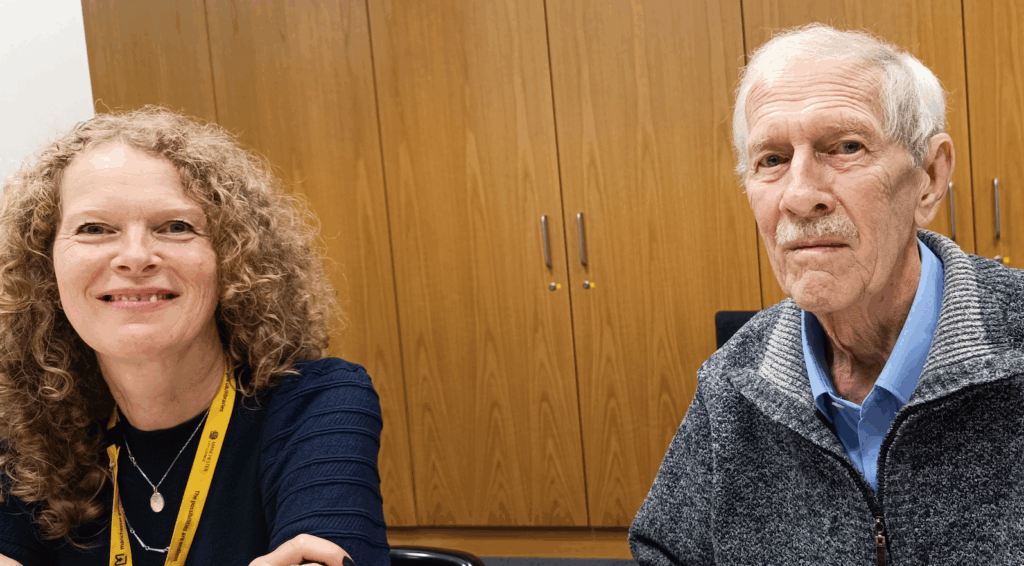
Gorton Tank or Gorton Locomotive Works was a huge railway plant covering many acres in East Manchester. It was located approximately where the New Smithfield market is today. It opened in 1848 to build and maintain railway stock and closed in 1966.
The products that came out of Gorton Tank, including steam engines, carriages, cranes, junction control systems and later diesel engines, went to industrialise not just Manchester and the northwest but Britain and through the empire, the furthest corners of the world.
In this program, recorded as part of Allfm’s Gorton Tank Project, Ken Hague (born in 1941) worked in the area throughout his working life. He, along with his daughter, Janine, recalls his memories of a now-bygone world.
